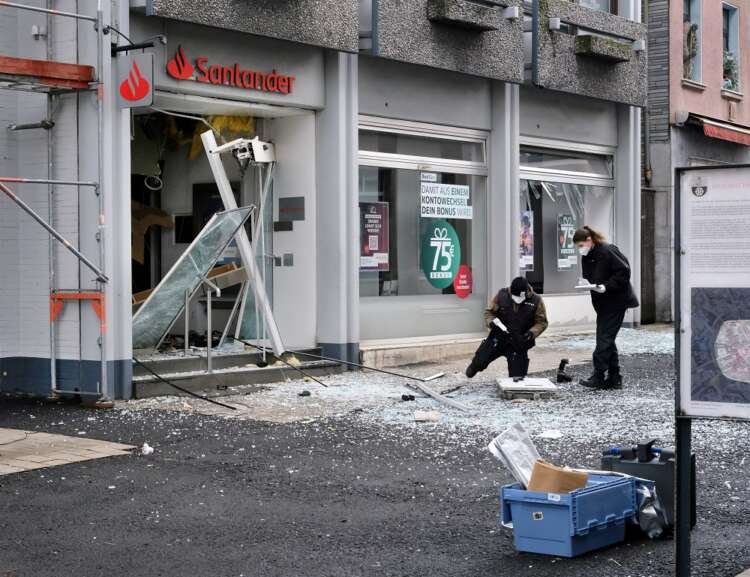Cash-loving Germans fret over exploding ATMs as cross-border crime wave hits


By Tom Sims and Nette Noestlinger
RATINGEN, Germany (Reuters) – In the German town of Ratingen, exploding cash machines are a hot-button topic.
Two got blown up early on the same morning last month, at branches of Santander and Deutsche Bank across the street from each other close to the Duesseldorf suburb’s main square.
A year ago, residents of the apartments above Santander unsuccessfully sued to have the machines removed due to concerns they could be raided – a gesture that might in retrospect be deemed prophetic in other countries.
But in Germany, thieves are blowing ATMs up at the rate of more than one a day.
Attacks are up more than 40% since 2019, according to the interior ministry, and investigators say two factors are driving the increase.
Europe’s largest economy has 53,000 ATM machines, a disproportionately high number that reflects Germans’ preference for cash rather than bank cards. The country also boasts an extensive network of highways, or Autobahns, on much of which no speed limit is enforced.
Ratingen lies just 70km (40 miles) from the Dutch border, and investigators say gangs from the Netherlands are the prime culprits for the attacks, which send glass flying, cause building facades to crumble and money cartridges to crack open.
Raiders got away with nearly 20 million euros ($22.1 million) in 2021, when 392 ATM explosions were recorded, a tally that rose to 496 in 2022. Police in the state of North Rhine-Westphalia, where Ratingen lies and which has borne the brunt of the attacks, have recorded 47 incidents so far in 2023, up on last year’s rate.
Meanwhile the frequency of ATM attackers is falling in the Netherlands, partly due to security measures such as glue that makes blocks of cash inside ATMs unusable, Dutch police say.
So Dutch cash machine raiders are crossing the border and, German police estimate, have carried out between 70% to 80% of attacks in Germany since 2018.
Dutch police suspect around 500 men are responsible, working in ever-evolving groups as new recruits replace those who get caught. Prosecutors in Frankfurt this week charged six Dutch citizens with causing explosions, theft and property damage.
Ratingen police are investigating a possible Dutch connection in last month’s twin raid too, having identified a small vehicle that sped from the scene to a nearby Autobahn.
On Thursday, nearly a month after the attacks, Santander’s facade remained boarded up. Deutsche Bank’s sign was still damaged, and a sign asked for customers’ understanding that ATMs were out of order while under repair.
In Germany, roughly 60% of everyday purchases are paid in cash, according to a Bundesbank study that found Germans, on average, withdrew more than 6,600 euros annually chiefly from cash machines.
Germany is also working with officials in Belgium and France and at Europol to combat the cash machine crime wave. The partner authorities did not respond to requests for comment.
Noting that ATM raids endangered lives, German Interior Minister Nancy Faeser this week urged banks to step up safety measures for ATMs.
Both Santander and Deutsche said they prioritised safety and were continuously improving ATM security, but banks inside Germany are reluctant to adopt blanket measures, instead advocating a case-by-case approach depending on individual security risk.
A spokesperson for Deutsche Kreditwirtschaft, a umbrella lobby group for the nation’s financial institutions, said: “Different locations come with different risks. There is currently no one-size-fits-all solution.”
($1 = 0.9044 euros)
(Additional reporting by Milan Pavicic; editing by John Stonestreet)
An ATM, or Automated Teller Machine, is a banking outlet that allows customers to perform financial transactions without the need for a human teller.
Cash management refers to the process of collecting, handling, and using cash in a way that maximizes liquidity and minimizes risk.
A crime wave is a sudden increase in criminal activity in a particular area, often leading to heightened public concern and law enforcement response.
Financial services encompass a broad range of services provided by the finance industry, including banking, investment, insurance, and asset management.
Security in banking refers to the measures and protocols implemented to protect financial assets, data, and transactions from theft, fraud, and other risks.
Explore more articles in the Banking category











